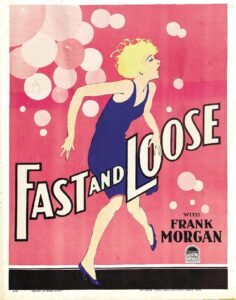 Edith Wharton, one of my favorite novelists, wrote a juvenile novel called Fast and Loose, and later she made it a plot point in one of her published works. When reading that, I had expected this metaphor to be a modern one she employed in the late 1800s. Yet I found, on some delving into the OED’s entry, a first example from the year 1555, though one from two years later may be more readable, given how much English spelling has changed in half a millennium: “Of a new maried studient that plaied fast or lose.”
Edith Wharton, one of my favorite novelists, wrote a juvenile novel called Fast and Loose, and later she made it a plot point in one of her published works. When reading that, I had expected this metaphor to be a modern one she employed in the late 1800s. Yet I found, on some delving into the OED’s entry, a first example from the year 1555, though one from two years later may be more readable, given how much English spelling has changed in half a millennium: “Of a new maried studient that plaied fast or lose.”
The reference does not necessarily portend anything salacious. Our film poster, above, does tend to imply exactly that. It’s not from Wharton’s works but it shows how popular the metaphor became by the late 1920s.
The OED’s first definition remains remarkably consistent today, “to be inconstant or inconsistent, esp. regarding one’s obligations to others; to behave immorally or irresponsibly.” Our “studient” and the 20s Flapper in the movie may have played fast and loose with money. That tends to be our usage today, or perhaps, and just as sadly, with facts.
Being irresponsible does not equal being immoral. That said, the drift of our metaphor implies doing something that hurts others. I’d say that being fast and loose with money or facts tends to injure, and it’s all too common with many public figures. So you decide if they deserve our admiration and attention.
If you have a word or metaphor you enjoy, send them by e-mail (jessid -at- richmond -dot- edu) or leaving a comment below.
See all of our Metaphors of the Month here and Words of the Week here.
Image source: Wikipedia page about the 1930 film.